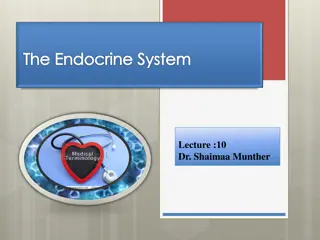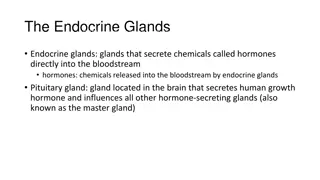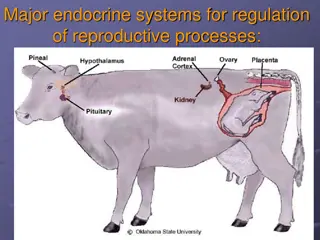Medical Terminology: Exploring the Endocrine System
The endocrine system, a network of glands that secrete hormones, plays a vital role in maintaining various bodily functions such as growth, development, metabolism, and reproduction. Learn about major endocrine glands, hormone functions, and the regulation of bodily functions by the endocrine system. Dive into the language of endocrine disorders and understand terms related to hormone imbalances and endocrine gland disorders in this informative lecture.
Download Presentation

Please find below an Image/Link to download the presentation.
The content on the website is provided AS IS for your information and personal use only. It may not be sold, licensed, or shared on other websites without obtaining consent from the author.If you encounter any issues during the download, it is possible that the publisher has removed the file from their server.
You are allowed to download the files provided on this website for personal or commercial use, subject to the condition that they are used lawfully. All files are the property of their respective owners.
The content on the website is provided AS IS for your information and personal use only. It may not be sold, licensed, or shared on other websites without obtaining consent from the author.
E N D
Presentation Transcript
2024 - 2023 Medical Terminology Lecture :10thMedical terminology denoting The Endocrine System Dr. Ali Hussein Al-Nasrawi Otorhinolaryngologist specialist
The Endocrine System: A Conductor of Hormones The endocrine system is a complex network of glands that secrete hormones, chemical messengers that regulate various bodily functions: It plays a crucial role in maintaining homeostasis, growth, development, metabolism, reproduction, and response to stress.
Major Endocrine Glands endocrine glands include: I. Pituitary gland: Often referred to as the "master gland," it controls the activity of other endocrine glands. II. Thyroid gland: Regulates metabolism and energy production. III. Parathyroid glands: Maintain calcium and phosphorus levels in the blood. IV. Adrenal glands: Produce hormones that respond to stress and regulate blood pressure and electrolyte balance. V. Pancreas: Produces insulin and glucagon, hormones crucial for blood sugar regulation. VI. Gonads (ovaries and testes): Produce sex hormones responsible for sexual development and reproductive function. Hormones: The Messengers of the Endocrine System Hormones in Action: The Language of Chemical Communication Hormones are chemical messengers that travel through the bloodstream to reach target cells and exert their effects. They bind to specific receptors on cell surfaces, triggering a cascade of events within the cell.
Endocrine System Functions: A Symphony of Regulation The endocrine system regulates a wide range of bodily functions, including: Growth and development: Hormones like growth hormone and thyroid hormones promote growth and development during childhood and adolescence. Metabolism: Hormones like insulin, glucagon, and thyroid hormones regulate the body's metabolism, influencing energy production and utilization. Reproduction: Hormones like estrogen, progesterone, and testosterone control the development of secondary sex characteristics, menstrual cycles, and spermatogenesis. Stress response: Hormones like cortisol and adrenaline help body adapt to stress by increasing heart rate, blood pressure, and energy levels. Fluid and electrolyte balance: Hormones like aldosterone and antidiuretic hormone (ADH) regulate fluid and electrolyte levels in the body, (hydration and electrolyte balance).
The Language of Endocrine Disorders Medical terminology provides precise language for discussing endocrine disorders. Common terms include: Endocrine gland disorders: These refer to abnormalities in the structure or function of endocrine glands, leading to hormone imbalances and related symptoms. Hormone imbalances: These occur when hormone levels are too high (hypersecretion) or too low (hyposecretion), causing various health problems. Endocrine disorders: These are broad terms encompassing various conditions affecting the endocrine system, such as diabetes, thyroid disorders, and adrenal gland disorders.
Diabetes mellitus is a metabolic disorder characterized by elevated blood glucose (hyperglycemia) due to Diabetes Mellitus: A Metabolic Disorder of Insulin Deficiency insulin deficiency or Diabetes Mellitus: When Insulin Can't Orchestrate Glucose Metabolism impaired insulin action. Types of diabetes include: Type 1 diabetes: An autoimmune disorder where the body attacks insulin-producing cells in the pancreas. Type 2 diabetes: Most common form, characterized by insulin resistance and relative insulin deficiency. Gestational diabetes: Develops during pregnancy due to hormonal changes affecting glucose metabolism.
Thyroid Disorders: A Symphony Disrupted by Hormone Imbalances Thyroid Disorders: When the Thyroid's Rhythm Goes Off-Key An illustration of the thyroid gland and thyroid hormones Thyroid disorders arise from imbalances in thyroid hormone production. Common types include: Hyperthyroidism: Excess thyroid hormone production, causing symptoms like rapid heart rate, weight loss, and anxiety. Hypothyroidism: Insufficient thyroid hormone production, leading to symptoms like fatigue, weight gain, and sensitivity to cold. Goiter: Enlargement of the thyroid gland, often due to iodine deficiency or autoimmune disorders. Your body controls your thyroid hormone (T3 and T4) levels through a complex feedback loop. Your hypothalamus releases thyrotropin-releasing hormone (TRH), which triggers your pituitary gland to release thyroid-stimulating hormone (TSH), which stimulates your thyroid to release T3 and T4.
Adrenal Gland Disorders: A Disruption of Stress Hormone Regulation Adrenal Gland Disorders Adrenal Gland Disorders: A Disruption of Stress Hormone Regulation When Stress Hormones Go Off-Balance Adrenal gland disorders affect the production of hormones like cortisol and aldosterone, crucial for stress response and electrolyte balance. Common disorders include: Cushing's syndrome: Excess cortisol production, leading to symptoms like muscle weakness, weight gain, and high blood pressure. Addison's disease: Insufficient cortisol production, causing symptoms like fatigue, weakness, and low blood pressure. Aldosterone deficiency: Impairs sodium retention and potassium excretion, leading to electrolyte imbalances and muscle weakness.
Pituitary Gland Disorders: A Symphony Disrupted at Its Core Pituitary Gland Disorders: When the "Master Gland" Misses a Beat Pituitary gland disorders arise from imbalances in the production of various hormones, affecting multiple bodily functions. Common disorders include: Acromegaly: Excess growth hormone production, leading to enlarged bones, hands, and feet. Dwarfism: Insufficient growth hormone production, resulting in shorter stature than expected. Prolactinoma: A tumor of the pituitary gland that produces excess prolactin, causing breast milk production in non-pregnant women and menstrual irregularities.
Gonadal Disorders: A Disruption of Sex Hormone Regulation Gonadal Disorders: When Sex Hormones Lose Their Harmony Gonadal disorders affect the production of sex hormones, influencing sexual development and reproductive function. Common disorders include: Polycystic ovary syndrome (PCOS): A hormonal disorder in women characterized by excess androgen production, irregular periods, and polycystic ovaries. Congenital adrenal hyperplasia (CAH): An inherited disorder causing excessive production of androgens, affecting sexual development and fertility. Turner syndrome: A genetic disorder in females characterized by one missing X chromosome, leading to short stature, ovarianinsufficiency, and other health problems.
Medical terminology provides precise language for discussing endocrine disorders. Additional common terms include: Hormone assays: Laboratory tests to measure hormone levels in the blood or urine, aiding in diagnosis and monitoring of endocrine disorders. Endocrine imaging: Specialized imaging techniques like ultrasound, CT scans, and MRI scans to visualize endocrine glands and detect abnormalities. Endocrine therapy: Medical treatment of endocrine disorders, including hormone replacement therapy, medications to regulate hormone levels, and surgical interventions.























